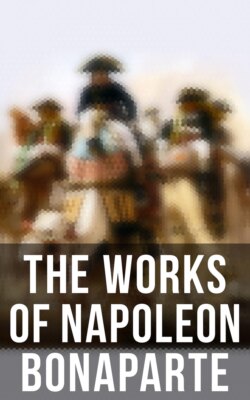Читать книгу The Works of Napoleon Bonaparte - Louis Antoine Fauvelet de Bourrienne - Страница 39
На сайте Литреса книга снята с продажи.
ОглавлениеMAXIM XXXIV.
Table of Contents
It should be laid down as a principle, never to leave intervals by which the enemy can penetrate between corps formed in order of battle, unless it be to draw him into a snare.
NOTE.
In the campaign of 1757, the Prince of Lorraine, who was covering Prague with the Austrian army, perceived the Prussians threatening, by a flank movement, to turn his right. He immediately ordered a partial change of front by throwing back the infantry of that wing, so as to form a right angle with the rest of the line. But this manœuvre being executed in presence of the enemy, was not effected without some disorder. The heads of the columns having marched too quick, caused the rear to lengthen out, and when the line was formed to the right, a large interval appeared at the salient angle. Frederick, observing this error, hastened to take advantage of it. He directed his centre corps, commanded by the Duke of Bevern, to throw itself into this opening, and by this manœuvre decided the fate of the battle.
The Prince of Lorraine returned to Prague, beaten and pursued, with the loss of sixteen thousand men and two hundred pieces of cannon.
It should be observed at the same time, that this operation of throwing a corps into the intervals made by an army in time of battle, should never be attempted unless you are at least equal in force, and have an opportunity of outflanking the enemy on the one side or the other; for it is then only you can hope to divide his army in the centre, and insulate the wings entirely. If you are inferior in number, you run the risk of being stopped by the reverses, and overpowered by the enemy’s wings, which may deploy upon your flanks and surround you.
It was by this manœuvre that the Duke of Berwick gained the battle of Almanza, in the year 1707, in Spain.
The Anglo-Portuguese army, under the command of Lord Galloway, came to invest Villena. Marshal Berwick, who commanded the French and Spanish army, quitted his camp at Montalegre, and moved upon this town to raise the siege. At his approach, the English general, eager to fight a battle, advanced to meet him in the plains of Almanza. The issue was long doubtful. The first line, commanded by the Duke of Popoli, having been broken, the Chevalier d’Asfeldt, who had charge of the second, drew up his masses with large intervals between them; and when the English, who were in pursuit of the first line, reached these reserves, he took advantage of their disorder to attack them in flank and defeated them entirely.
Marshal Berwick, perceiving the success of this manœuvre, threw open his front, and deploying upon the enemy’s flanks, while the reserve sustained the attack in front, and the cavalry manœuvred in their rear, obtained a complete victory.
Lord Galloway, wounded and pursued, collected with difficulty the remains of his army, and took shelter with them in Tortosa.
